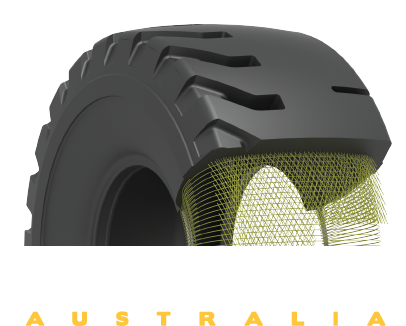TyreInfo
Tyres are NOT just consumables. They are a high value asset.
Monday, July 06, 2015
Tyres form a highly ranked cost centre in a mining or transport operation, quite often being second only to fuel.
In the life of a trucks engine, tyres will cost more money than the engine costs to rebuild.
Tyres are an investment in making a profit, without tyres the truck does not move.
If tyres fail when a truck is in operation, the outcomes can be very expensive, from a safety perspective to then repairing the resultant damage.
So why does management generally ignore the investment made in tyres? So why is tyre maintenance relegated to once a week if we get to it?
Tyres work so well just soaking up the abuse that’s dealt out to them without complaint or protest. If we treated our engines the same way we treat tyres they would expire well before they should do and everyone would be complaining!
It is startling to hear management speak of cost cutting and economics yet continue to ignore their second largest cost centre, TYRES!
A tyre running at 10% less than its ideal pressure wears out 12% faster than it should do. It consumes 2 – 3% more fuel than it should do due to increased rolling resistance.
A difference of ONLY 5 psi between dual tyres decreases wheel‐bearing life by 10%
A difference of only 5 psi between duals means one tread wears faster, the casing on the other tyre fatigues faster, overall effect is a large life reduction.
Differences in tyre pressures across axles impose additional loadings on drivelines, from wheel ends back through differentials to transmissions, reducing life and increasing costs.
Tyres are messengers, they tell of the vehicle condition and maintenance philosophies. A worn out shock absorber will show up on a tyre, misalignment shows up on a tyre, maladjusted brakes show up on tyres, a trailer dog tracking will show up on steer tyres.
Simply put tyre rely upon the correct pressures to perform as designed, for a truck to brake within the distance the vehicle designers intended, to steer as designed and to put the power to the ground as the vehicle designers intended tyre pressures must be correct. If tyres are not maintained correctly then costs escalate, without anyone actually realising. No ABS or ESC can compensate for poor tyre pressure maintenance!
How many maintenance managers can tell you how many cents per unit distance their tyres cost to operate? They can tell you all about the fuel and how this truck and this driver are XYZ... but then don’t know about their next largest cost centre, those round black things called tyres that no one wants to know about?
I presented a statement about tyres to a major distribution company that prides itself on knowing how their buildings operate down to the last light globe. The board members jaw collectively hit the table when they realised the fact they had over 4000 assets worth in excess of $3,500,000 that they had no idea about, no control over and did not know how much they cost to operate.
These assets directly affect the safety of their operations, directly affect their bottom line and they had no control or knowledge about these assets. The danger for damage to their reputation was immediately realised with no tracking of tyre assets undertaken no evidence was available to demonstrate diligence in maintenance.
Using real time monitoring tyre pressures are easily maintained. Hot operating pressures are different from cold pressures. A well‐maintained tier 4 emission‐controlled truck showed a difference of more than 5 psi between dual drive tyres on both drive axles in operation. The cold pressures were set accurately but in operation, the pressure varied considerably. The result, decreased tyre life, decreased tyre performance in traction both under drive and braking, increased fuel consumption. With data collected from real time tyre pressure monitoring changes were made to achieve even operating pressures. Costs decreased, profits increased.
How do you know what your operating pressures are? Without real time monitoring you actually have no idea, weekly pressure checks tell you nothing, they do put money into the pocket of your tyre service provider, money for jam.
Why does management ignore their second largest ongoing investment? I can only conclude they are making too much money to worry about it. Sounds like a recipe for disaster to me. “No Your Honour I cannot demonstrate that we have maintained the tyres on our fleet appropriately and safely” is an over whelming situation to be put in. How would you deal with that situation?
How do you maintain your tyres? With a hope and a pray, once a week? Real time pressure monitoring provides positive economic return on investment, provides safety outcomes that cannot be valued, it is simple and effective.
Look after your tyres in real time and they will continue to look after you, safely and economically.
